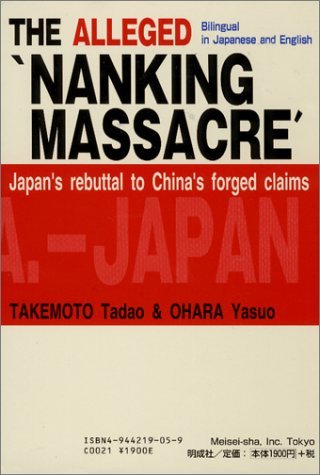Censorship, both government inspired and individual-inspired, became important both in film and in newspaper reporting. Even books were used to fan the feelings in Japan. For example, in 1938 there were 38 books attacking the Jewish presence in Japan which was quite interesting since, for all practical purposes, there were no Jews in Japan.
Even the language became controlled which a reaction set in to the use of foreign words in the language and English was labeled "the enemy language." The people were being put into a mind-set of war by their government and by the media. This becomes important when considering why some people consider that the Japanese have not sufficiently apologized for the Nanking massacre and other actions. In effect, the population was being given the mind-set that it was the Japanese who were being attacked and provoked by the Chinese, not the other way around, and why apologize for something you didn't actually start?
If you dehumanize a group of people then it becomes easier to justify anything that you end up doing to them.
According to the book Japan in the 21st Century: Environment, Economy, and Society (2005):
"It is widely accepted among scholars that after the sudden collapse of the Chinese defense of Nanjing in December, 1937, rampaging Japanese soldiers executed thousands of prisoners of war, civilians as well as men suspected of being soldiers, and burned the homes of Chinese. According to some, as many as 300,000 were killed in Nanjing; Japanese accounts vary from several thousand to 200,000 dead, while some Japanese politicians deny that the massacre ever took place. The Tokyo War Crimes tribunal concluded that more than 140,000 people were killed...making it one of the worst atrocities committed by Japanese forces before and during World War II."
There are some Japanese, like the paragraph above notes, that simply deny that the massacre ever took place, much as some people are denying that the Holocaust ever took place, despite all the spoken, written and photographic evidence to the contrary. Even though over sixty years have passed since the events the feelings are still quite strong in China over what happened. That hurts Chinese-Japanese political relationships. Another thing that is a sticking point is when Japanese politicians visit war memorials to Japanese dead.
This all stems from the original invasion of China by Japan when they seized Manchuria and renamed it Manchuko, then tried to seize the rest of China but failed, especially when they had to withdraw men and materials to help them in their battle against the United States forces in the Pacific Ocean.
There was also a movie shot in Nanking just days after the fall of the city. The moving is called Nanjing, or Nankin, 1938. This became a propaganda film for the Japanese as the film-maker reported only on the things that made the Japanese look good and did not include the reality of the horror that was actually happening.
Again, from the book The Imperial Screen: Japanese Film Culture in the Fifteen Years' War 1931-1945, 2003, the film editor's own words:
"'Chinese civilians had been forced to line up along a high fence. The line seemed to stretch on endlessly and when I walked beside them many began calling out to me, some holding out to me rancid-smelling bags of tobacco or handfuls of paper money. Their faces were imploring and grief stricken. Since all of them were on the way to be shot, even I became the object of their desperate supplications. Although I understood their forlorn entreaties, I could do nothing and this made me very sad.'"
What actually ended up in the film glorified the Japanese, though, and avoided the sufferings of the Chinese people.
The killings were not limited to Nanking, of course. According to the book Japan:A Modern History, 2002:
"Nanjing was not unique. Throughout China, Japanese soldiers plundered Chinese property, shot farm animals for food, and raped women of all ages. In the north, where constant attacks from Communist partisans made it seem as if every single villager were an enemy guerrilla, Japanese routinely tortured and abused peasants by smearing them with benzene and setting them afire, by bayoneting pregnant women, and by forcing children to walk into suspected minefields."

This is one of the books that holds that there was no actual rape of Nanking. Some people would brand it a "revisionist" type of history book.
My review of the book The Rape of Nanking
Main Index
Japan main page
Japanese-American Internment Camps index page
Japan and World War II index page